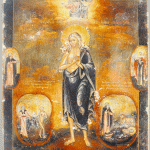[Editor's Note: This week's column is a continuation of last week's column about the importance of being both spiritual and religious.]
Two weeks ago I promised to give a few of the reasons I believe it is important to be both spiritual and religious.
This week's reason?
You can't be spiritual alone.
The Reformation, Romanticism, individualism, and consumerism have given rise to a version of the Gospel that—as silly as it sounds—is all about us or, really, all about me (or you, if you were me).
It is a mindset that arises from the American Spiritual Landscape, past and present. The priesthood of all believers on steroids—the Gospel as a motivational, self-help message with cosmic sponsorship. As the t-shirt says, "Jesus loves you, but I'm his favorite."
This message is so common and shot through so many parts of the church that it has completely altered the way in which we tell the Christian story. Nearly every construal of Christian community and theology has a version of it, whether it is about Jesus and me, Jesus and my group, or Jesus and our politics.
If, however, as I said two weeks ago, our spiritual destinies are corporate in nature—if we are redeemed individually in order to participate in the body of Christ—if the Christian story is about the vindication of God's claim to be God and the redemption of humankind as the pivotal battle to justify that claim—then the energy of this "all-about-me" message is at odds with the Gospel itself.
From a Christian point of view, the conviction that you can't be spiritual alone is not a practical consideration. It's not about proving that "No one is an island" by demonstrating how difficult it can get without help to live the spiritual life. It is about the flat denial that living for ourselves is what this life is about, even if living that life is ostensibly connected to God.
That is why church (a.k.a., religion) is important. It is not important because of its structures, its bureaucracy, its offices, or its pomp and circumstance. Not because it has a lock on the only truths out there, not because it is even faithful to its own message. Church matters because from a Christian point of view our spiritual destiny is corporate, as well as individual.
That is why—again, from a Christian point of view—it is also not enough to say, "I have a community. I have friends. We support one another."
To be sure, communities of that kind have their value, including spiritual advantages. Nothing works more smoothly than communities of the like-minded, who share cultural, social, economic, racial, and ethnic bonds.
But from the church's point of view the spiritual life involves a reconciling and forgiving enterprise that embraces the world, vindicates the claim that God is God, and includes the other—not just friends, but enemies—not just those whose lives fit comfortably with ours, but those that grate on our nerves and fit awkwardly with our worlds just as we fit awkwardly with theirs. God's reconciling work may include people we call friends, but it is not confined to them. The Christian notion of community includes people we resist calling friends as part and parcel of that reconciling and forgiving enterprise.
In other words, when it is at its best (and there are times when it is far from it) church matters because of its weaknesses as a community—its lack of homogeneity—its random collection of struggling souls. We benefit and grow from it in our understanding of God's grace because we cannot select a cohort of like-minded souls or cross-examine those next to us before we share the body and blood of Christ. It is effort to bring together people who are seeking God and who can say with candor to one another:
"You may have missed this..."
"You may not know as much as you think..."
"God may be more gracious than you think..."
"God may expect more of us than you imagined..."
"The one you thought was unlovable is loved..."
Welcome to a world in which you cannot be spiritual alone. Welcome to a world in which you cannot pick the people you think are spiritual. Welcome to the church.
12/2/2022 9:10:37 PM





